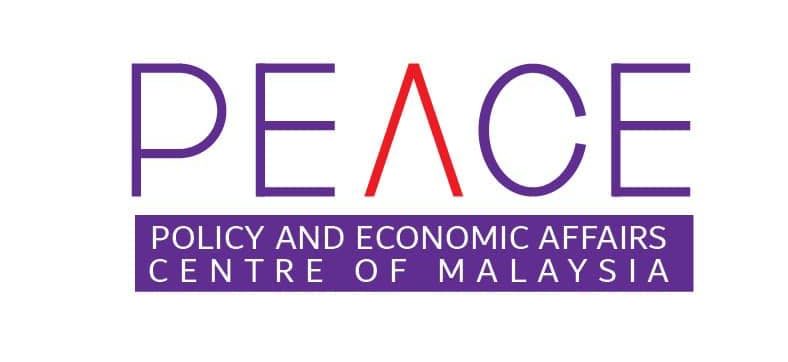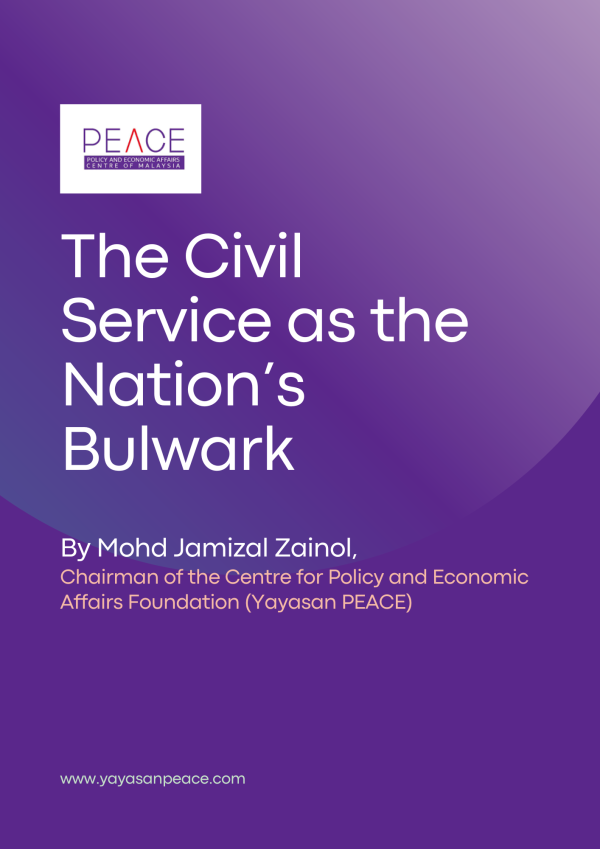By Mohd Jamizal Zainol, Chairman of the Centre for Policy and Economic Affairs Foundation (Yayasan PEACE)
“Religion is our foundation,
The Constitution our pillar,
The Rukun Negara our compass,
We are Malaysia’s bulwark.”
- These stirring lines from the official anthem of the Malaysian Civil Service still echo in my ears, sung with unyielding spirit by thousands of officers during the 20th National Civil Service Assembly (MAPPA XX) at the Putrajaya International Convention Centre last week. We are Malaysia’s bulwark. We are Malaysia’s bulwark.
- The words are short, yet their meaning profound. If one were to ask me: would the Government of Malaysia still function without politicians and cabinet ministers? My answer would be: certainly yes. For it is the civil servants who give life to the laws and policies of the land. The Cabinet formulates policy, but even without new policies, the civil service stands ready to administer existing ones. The machinery of government continues to turn.
- When we speak of “Government,” what do we mean? It is not merely ministers. It encompasses the Yang di-Pertuan Agong, the Chief Secretary to the Government, the Secretaries-General of Ministries, and the 1.6 million civil servants who keep Malaysia’s institutions alive. Their appointments and dismissals rest upon the consent of the King. Every act of public administration is thus “Urusan Seri Paduka Baginda” — the Affairs of His Majesty.
- It becomes clear, then, that the civil service is permanent, enduring through time. What changes are the politicians who come and go with the tides of elections. The uniqueness of Malaysia’s administration lies in its continuity: even as ruling parties shift, the civil service holds the line. This is the true meaning of the civil service as the nation’s bulwark.
- This stability allows the civil service to carry forward the policies of today’s Unity Government — namely the Madani vision — with responsibility and efficiency. To serve is not merely an occupation but a sacred trust. It unites religious principles, constitutional supremacy, and the ideals of the Rukun Negara into a noble devotion to the homeland. Yet, alongside this noble tradition, modern demands require a service that is faster, more transparent, and more adaptive. Globalisation, artificial intelligence, and the people’s ever-growing expectations for integrity and performance demand reform — not mere slogans, but urgent action.
- Thus, the Prime Minister has set forth the Public Service Reform Agenda (ARPA) as a new roadmap. Five pillars form its foundation: comprehensive digitalisation, a culture of high integrity, empowerment of competencies, reduction of bureaucracy, and strengthening of governance. Such reform requires a dedicated unit, agile and elite, to strategise and execute ARPA with precision. Not a large army, but a small corps of high-performance officers serving as its “commandos.”
- For this purpose, the Performance Acceleration Coordination Unit (PACU) under the Prime Minister’s Department has been tasked with driving ARPA. To date, I am informed that 35 initiatives have been rolled out. Among the most significant: the MyGov360 portal, a single gateway integrating government digital services, and the National Digital ID, which will ease transactions across agencies.
- All these initiatives serve one “true north”: Reforming Bureaucratic Red Tape (RKB). The results are already visible — annual compliance cost savings of RM1.5 billion, and measurable gains in Malaysia’s global competitiveness rankings, such as the World Competitiveness Report and the Blavatnik Index for Public Administration. Credit is due to PACU, now a model of progressive civil service, blending technical efficiency with disciplined execution.
9 But reform cannot be complete without civil society’s partnership. Early this year, Yayasan PEACE together with the Institute of Integrity Malaysia launched the book The Prime Minister’s Mandate on Integrity and Governance, a collection of selected addresses by the Prime Minister. It is a volume that every civil servant and Malaysian should read, for it calls us to make integrity not rhetoric, but an institution.
- Yayasan PEACE recognises that civil servants are human beings, whose spirit sometimes soars and at times wanes. Policies, no matter how noble on paper, will falter unless we account for the realities of human nature. Thus, we propose a philosophy of Collaboration and Competition to raise administrative performance. Promotions and bonuses must be merit-based, guided by transparent KPIs that measure effectiveness, innovation, and impact — not merely seniority. Key leadership positions should be filled openly, with some strategic posts opened to external experts.
- Furthermore, cross-ministry task forces should address complex issues such as climate change, poverty, and AI governance. A Civil Service Knowledge Cloud could serve as a central repository of case studies and best practices. A Collaborative Training Academy, in partnership with universities and think tanks, should prepare the next generation of public sector leaders. Finally, a Peer Review Mechanism — ministries reviewing one another’s policies before Cabinet submission — would raise quality through collaboration.
- It must be stressed: Malaysia’s civil service is not merely a modern bureaucracy inherited from Westminster. It is also imbued with the spiritual philosophy of amanah (trust) rooted in the Malay-Islamic tradition. In Taj al-Salatin (1603), Bukhari al-Jauhari wrote that a ruler and his officials carry God’s trust to safeguard the people. This responsibility is not only institutional, but sacred — to both God and man. Hence, every civil servant is not just a bureaucrat but a khadam rakyat — a servant of the people — bound by a moral contract between humans, and between humanity and the Creator.
- In short, Malaysia’s administrative philosophy is a hybrid: combining the modern structures of the West with the spiritual-moral ethos of Malay-Islamic heritage. The relationship between civil servants and politicians is not merely technical; it is grounded in adat, tradition, and culture. Politics gives direction and power; administration provides wisdom and continuity; the people remain witness and beneficiary of this trust. If these principles are truly upheld, the civil service will remain the nation’s ultimate bulwark — ensuring Malaysia’s peace, harmony, and progress.
“A good nation is like a great tree:
its trunk the government, its roots the administration, its leaves the people.
If the roots are torn out, the trunk falls;
if the trunk breaks, the leaves wither.”

